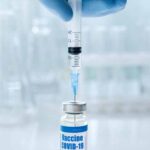Dr. Kim shares that he saw this reflected in his experience in St. Louis, a city with sharply demarcated socioeconomic and racial inequalities. “At least at WashU, the entire COVID experience has led us to have a much more concerted effort to understand the social determinants that drive health disparities.” He points out that it’s critical we come to understand these issues better, ideally identifying and implementing interventions that can help us better mitigate these disparities.
The history of racial injustice and patients’ negative experiences with culturally insensitive healthcare are one aspect of vaccine hesitancy in minorities.8 Asian and white adults had the highest COVID-19 vaccination rates by the end of April 2021, with lower rates in Hispanic, Black and Indigenous Americans. However, by the fall, coverage was similar for Black, Hispanic and white people by some estimates (78.2%, 81.3%, 78.7% respectively) although it remained lower for Indigenous Americans.9
This issue of vaccine hesitancy still looms large: About 80% of the total U.S. population has received at least one dose of vaccine, and about 68% completed a primary series. “Numerous groups are looking at this issue with high granularity, and I’ll be fascinated to see where we might have opportunities to both empathize with our patients’ concerns and fears about vaccination and educate them about the true risks and benefits of vaccination,” says Dr. Kim.
Looking Forward
Much uncertainty remains about how COVID-19 will continue to affect patient management. Dr. Kim explains that given recent input from the CDC, we should expect new COVID boosters to come out annually—despite the reduced mutational rate that SARS-CoV-2 possesses compared with other viruses like H. influenzae.
“Some subgroups of people, including some of our rheumatology patients, may need boosters more frequently than people in the general population,” says Dr. Winthrop. “We are still awaiting data to guide this decision making.”
Hopefully, effective monoclonal antibody treatments against newer omicron strains will soon be available for the most at-risk patients. AstraZeneca is engaged in the phase 1/3 Supernova trial for a new monoclonal antibody combination, AZD5156, which contains cilgavimab and a new long-acting monoclonal antibody, AZD3152.11
Dr. Winthrop emphasizes the importance of encouraging patients to complete their full vaccination schedule, including the most recent bivalent booster, which provides better protection against some omicron strains compared to earlier versions. He recommends making sure patients have rapid COVID tests at home and encouraging them to call the clinic so they can get anti-viral therapy promptly. Dr. Winthrop also encourages his most vulnerable patients to keep protective measures in place in some situations (e.g., masking on a plane flight).



